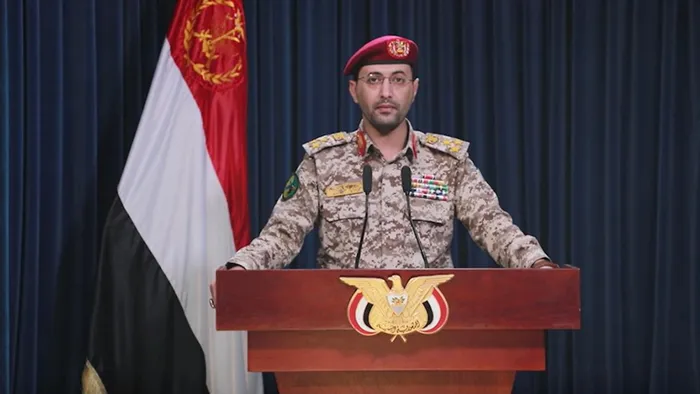Joint Yemeni, Iraqi attack hits a vital Israeli target in Umm Al-Rashrash

The spokesperson of the Yemeni Armed Forces, Brigadier General Yahya Sare’e gives a press conference. Israel has provoked a continuously escalating conflict in the region which involves not only the region’s resistance groups, but also the US and the UK, the writer says. – Picture: X
By Aseel Saleh
The spokesperson of Ansar Allah-led Yemeni Armed Forces, Brigadier-General Yahya Sare’e, announced on Tuesday July 9, that the forces launched an attack on a “vital target” within Umm Al-Rashrash, known in Hebrew as Eilat, in southern Israel. The attack was launched with the help of the Islamic Resistance in Iraq using a number of combat drones.
In his statement, Sare’e confirmed that the Israeli target was hit accurately, without revealing further information about the nature of the target. Sare’e also vowed that the forces will continue carrying out joint operations with the Iraqi Islamic Resistance in solidarity with the Palestinian people, until Israel stops its aggression and lifts the siege on the Palestinian people in the Gaza Strip.
The announcement of the joint attack coincided with the confirmation by Iraqi officials that an office affiliated with Ansar Allah has been established in Baghdad.
The same day, the Israeli army stated that “a suspicious aerial target” was intercepted by its fighter jets while approaching southern Israel without crossing into Israeli territory.
The attack on “Eilat” was carried out a couple of days after Ansar Allah leader, Abdul Malik Al-Houthi, had warned Saudi Arabia not to collude with the United States and the United Kingdom in taking any “aggressive steps” against Sanaa and in support of Israel.
Since the beginning of the Israeli aggression on Gaza, the Ansar Allah-led Yemeni Armed Forces have launched scores of attacks on commercial ships connected with Israel in the Red Sea and the Gulf of Aden.
In January 2024, the United States and the United Kingdom began to launch airstrikes on Ansar Allah targets in Yemen, which the US President Joe Biden described as “direct response” to the attacks on Red Sea ships, which “jeopardised trade, and threatened freedom of navigation”. Over 50 Yemenis have been killed in these airstrikes.
The airstrikes are part of Operation Poseidon Archer, meant to be distinct from US-led maritime force Operation Prosperity Guardian, an international maritime coalition launched in December 2023 in order to counter the Ansar Allah Red Sea blockade.
US Department of Defence spokesperson Pat Ryder called the group “bandits along the international highway that is the Red sea” and alleged that “they are attacking the economic well-being and prosperity of nations around the world”.
As the Red Sea has always had a strategic importance being one of the world’s major sea lanes, the attacks launched by the Yemeni Armed Forces have significantly affected the Israeli economy.
On Wednesday, July 3, the CEO of Israel’s Eilat port Golber Gideon called on the Israeli government to provide the port with financial assistance after being inactive for several months as a result of the Yemeni Red Sea-blockade.
The conflict has been raging in the region since the Israeli aggression on Gaza started. While Ansar Allah has been pressuring Israel and the West making the Red Sea inaccessible to their vessels, Lebanon’s Hezbollah has intensified its attacks on the northern territories occupied by Israel especially after a number of its senior officials were killed by the Israeli occupation.
Meanwhile, on Israel’s northern border, on July 7, Hezbollah announced the assassination of Yasser Nimr Qarnabsh, a former bodyguard of Hezbollah leader Hassan Nasrallah in an Israeli airstrike that targeted a vehicle he was getting into in Syria.
Hezbollah responded to Qarnabsh’s assassination by launching around 40 rockets on the Golan Heights, killing two Israelis. On the same day, Hezbollah also released a video showing footage of 17 Israeli military sites in the Golan Heights.
The footage is said to be gathered by Hezbollah’s surveillance aircraft.
The Israeli media described the video release as a propaganda, whereas Hezbollah media relations officer Mohammad Afif highlighted the importance of the video in demonstrating Hezbollah’s technical and technological capabilities in the field of surveillance and obtaining necessary information it needs in times of war.
This article was published on Peoples Dispatch